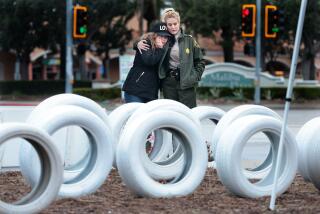Legality in Doubt : Davis Unveils Plan to Allow Searches of Autos for Guns
- Share via
SACRAMENTO — State Sen. Ed Davis, a former Los Angeles police chief, Wednesday unveiled a bill he said would give law enforcement agencies a valuable tool to fight gang violence by permitting them to conduct searches of automobiles for guns even without reason to believe that a crime has been committed.
The bill, which civil libertarians immediately challenged as unconstitutional, would phase in a program that would permit random searches of vehicles in specified high-crime areas after an emergency was declared by local elected officials.
It also would allow superficial visual inspections for weapons at checkpoints much like those now used to detect drunken drivers, even when an emergency has not been declared.
“We must be able to protect ourselves one way or another from murder,” Davis (R-Valencia) said in an interview after a press conference where he announced the measure.
He identified South-Central Los Angeles, where gang violence and drive-by shootings are common, as one area where the proposed law might be invoked.
No Legal Precedent
Davis acknowledged that there is no legal precedent in this country for random searches of automobiles.
But, he said, “we’re going to make legal precedent. . . . This, I think, has a chance of being declared constitutional. Who in the world would oppose this except my friends in the ACLU?”
Joan Howarth, associate director of the American Civil Liberties Union of Southern California, said the Davis bill, if enacted, would be a clear violation of citizens’ Fourth Amendment protection against unreasonable searches.
“There is not a court in the land that would uphold that proposal,” she said.
Howarth said Davis’ plan “would suspend the Constitution. . . . The only reason anyone would be proposing this is the deep frustration so many of us have about crime that seems to be out of control.”
Davis said he thought his bill could survive the ACLU’s inevitable challenge because city councils and county supervisors, after reasoned debate, would authorize the random searches, rather than police agencies. That approval process would show that the decision to search was reached after sufficient deliberation, Davis said.
“All searches are not prohibited, only unreasonable searches,” he said.
Even after an emergency was declared, only drivers who had renewed their licenses after January, 1990, would have to submit to searches since they would have agreed to allow the inspections as a condition of license renewal, Davis said.
Within four years, all drivers licensed by California would have signed forms authorizing a weapons search in emergency situations, the senator said. Such a condition can be placed on a driver’s license because driving is a privilege, not a right, Davis said.
“This is a reasonable restraint on that privilege,” he said.
Howarth, however, said drivers cannot be forced to sign away a right to privacy in exchange for a license.
“People in California, particularly Southern California, need to drive to go to school and to work and to conduct their lives,” she said. “The right of travel has been recognized in this state and other states” by the courts.
Davis’ bill should also be challenged, she said, because it allows cars to be stopped at checkpoints and examined for weapons, though not thoroughly searched unless evidence of weapons is detected.
Legality Upheld
The legality of sobriety checkpoints, after which Davis’ provision is modeled, was upheld 4 to 3 by the state Supreme Court in 1987 after the majority concluded that a minimal intrusion into a driver’s privacy was justified for the public good.
Davis’ bill, in allowing an examination that is likely to take longer than a sobriety check, would seem more intrusive and the court would be unlikely to approve it, Howarth said.
Davis said the legal principals on which checkpoint inspections for weapons would be based have been upheld in the state and federal supreme courts.
While Davis said he knew of no previous effort to rewrite the law on weapons searches, Berkeley City Atty. Manuela Albuquerque said that she studied the use of legal principals applied to sobriety checkpoints in 1987 and was convinced that they could not be used effectively on the streets.
She said she concluded that the precedents on sobriety searches would not apply to any kind of weapons stop.
Albuquerque added: “Our police said there would be no way to detect weapons” based upon the superficial inspections courts allow at sobriety checkpoints.
“My conclusion was that the constitutional limitations were such that we couldn’t get any practical benefit unless we transgressed them.”
More to Read
Sign up for Essential California
The most important California stories and recommendations in your inbox every morning.
You may occasionally receive promotional content from the Los Angeles Times.









